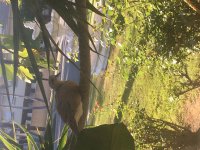Hi! A bird has been hanging out in the tree outside our window for two weeks now, eating from our bird feeder and watching everything we do in the living room. At first I thought the stationary activity was because s/he was sick (there is no nest in sight, and he roosts here ALL day and night), but now I am wondering if s/he was previously domestic. It seems that a ringneck dove is domestic and a eurasian collared dove is not. Could anyone help me determine what kind of dove s/he is? The coo sounds like the one identified on youtube as a ringneck dove, but I'm not a bird expert and it could be misidentified/share the same coo as a collared dove: https://www.youtube.com/watch?v=gbkOqgvqId0&t=50s
-
Welcome to BirdForum, the internet's largest birding community with thousands of members from all over the world. The forums are dedicated to wild birds, birding, binoculars and equipment and all that goes with it.
Please register for an account to take part in the discussions in the forum, post your pictures in the gallery and more.
Ringneck Dove or Eurasian Collared Dove? Southern California (1 Viewer)
- Thread starter smsorenti
- Start date





